International Business: McDonald's Environment and Strategy Report
VerifiedAdded on 2020/06/04
|9
|2729
|68
Report
AI Summary
This report provides a comprehensive overview of international business operations, using McDonald's as a primary case study. It begins with an introduction to the international business environment and the concept of globalization, highlighting factors that facilitate international trade and its advantages and disadvantages. The report then delves into the mechanisms that regulate international trade, including free trade principles, the economics of scale, and various trade barriers. Furthermore, it analyzes how the environment and culture of a country impact businesses operating internationally, employing PESTLE analysis to examine political, economic, social, and technological factors. The report also explores the influence of the monetary environment on international businesses, discussing foreign exchange markets and the significance of financial management. It identifies the reasons why businesses choose to operate internationally, such as growth, market diversification, and increased profitability. Finally, the report examines the business strategies used by companies like McDonald's in expanding into new markets, emphasizing the importance of understanding local market conditions and adapting business models accordingly.
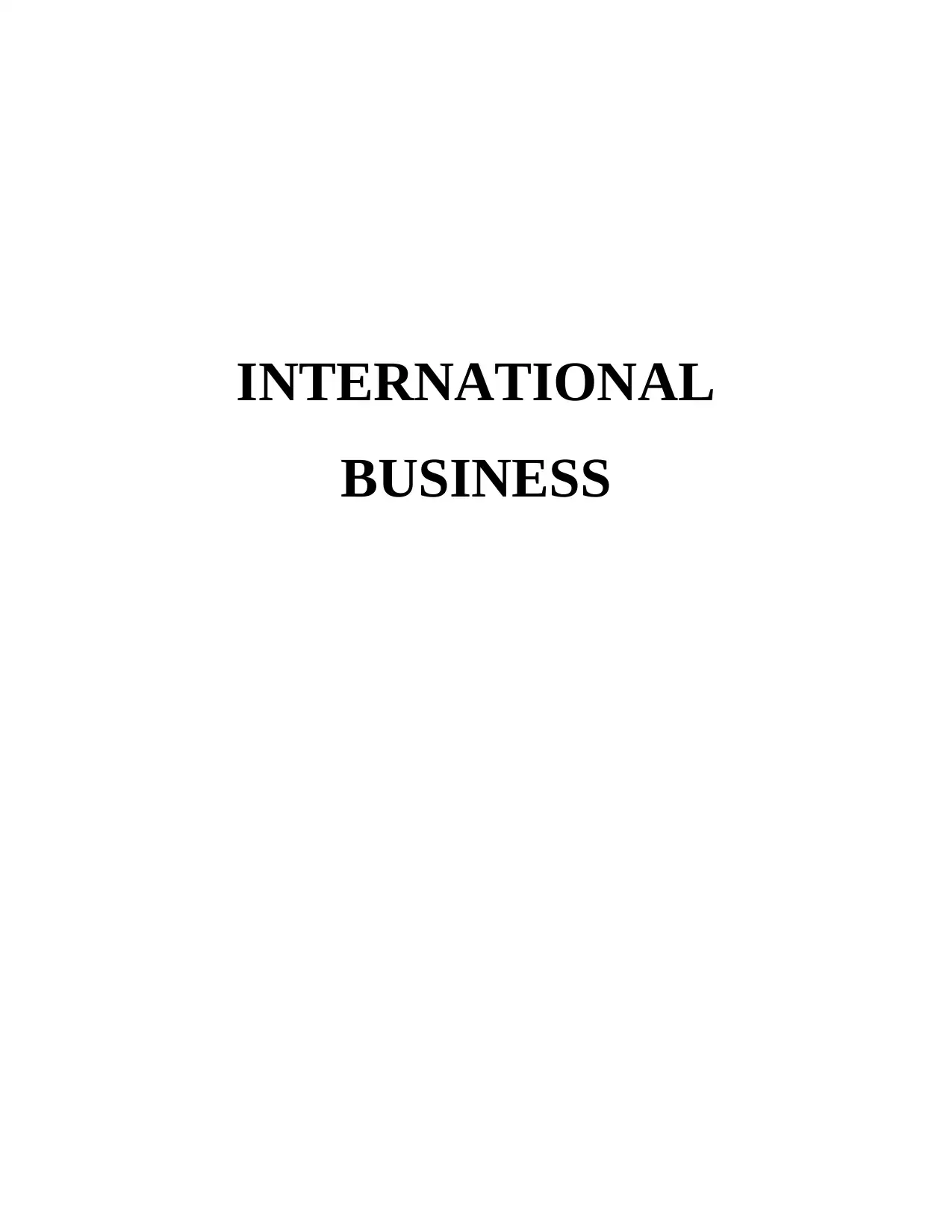
INTERNATIONAL
BUSINESS
BUSINESS
Paraphrase This Document
Need a fresh take? Get an instant paraphrase of this document with our AI Paraphraser
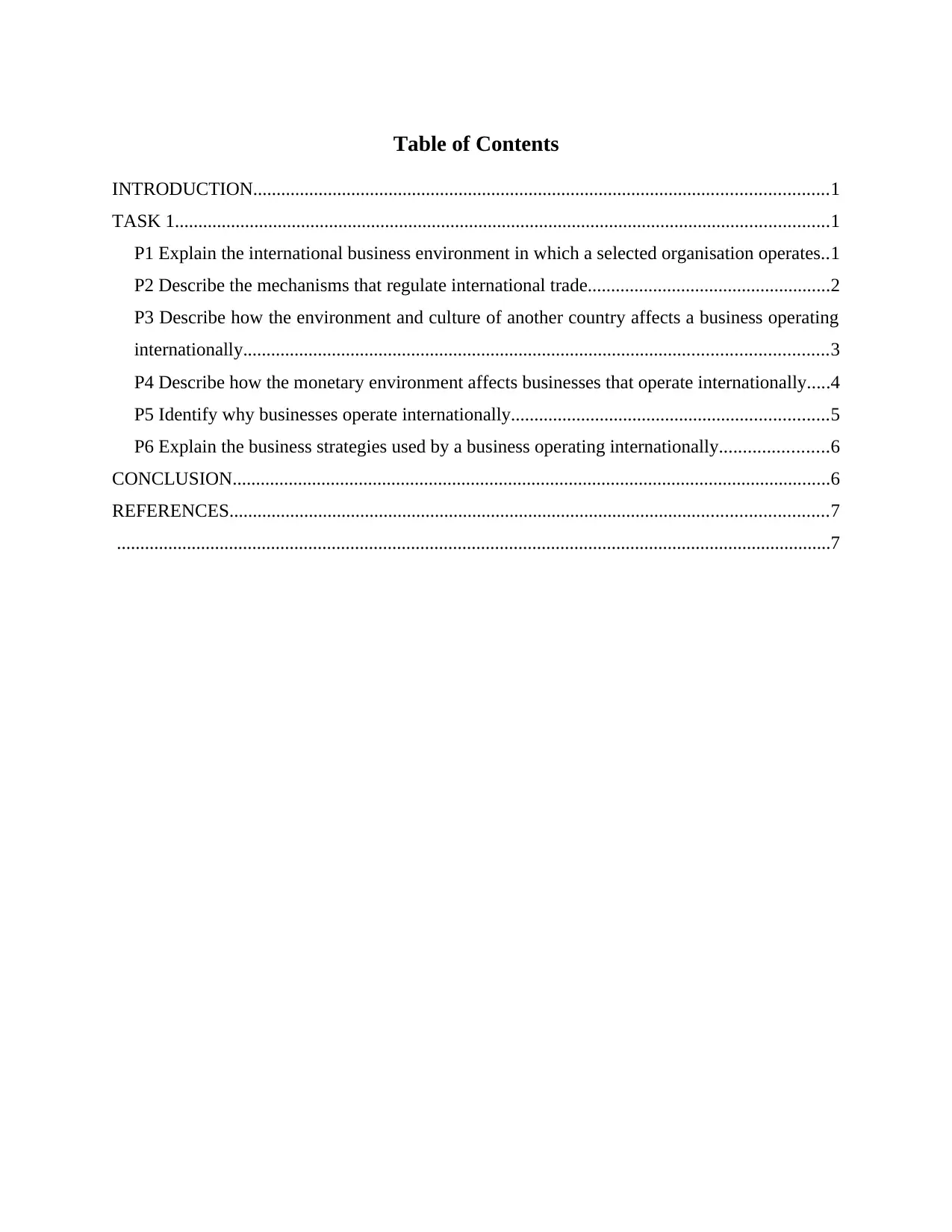
Table of Contents
INTRODUCTION...........................................................................................................................1
TASK 1............................................................................................................................................1
P1 Explain the international business environment in which a selected organisation operates..1
P2 Describe the mechanisms that regulate international trade....................................................2
P3 Describe how the environment and culture of another country affects a business operating
internationally.............................................................................................................................3
P4 Describe how the monetary environment affects businesses that operate internationally.....4
P5 Identify why businesses operate internationally....................................................................5
P6 Explain the business strategies used by a business operating internationally.......................6
CONCLUSION................................................................................................................................6
REFERENCES................................................................................................................................7
.........................................................................................................................................................7
INTRODUCTION...........................................................................................................................1
TASK 1............................................................................................................................................1
P1 Explain the international business environment in which a selected organisation operates..1
P2 Describe the mechanisms that regulate international trade....................................................2
P3 Describe how the environment and culture of another country affects a business operating
internationally.............................................................................................................................3
P4 Describe how the monetary environment affects businesses that operate internationally.....4
P5 Identify why businesses operate internationally....................................................................5
P6 Explain the business strategies used by a business operating internationally.......................6
CONCLUSION................................................................................................................................6
REFERENCES................................................................................................................................7
.........................................................................................................................................................7
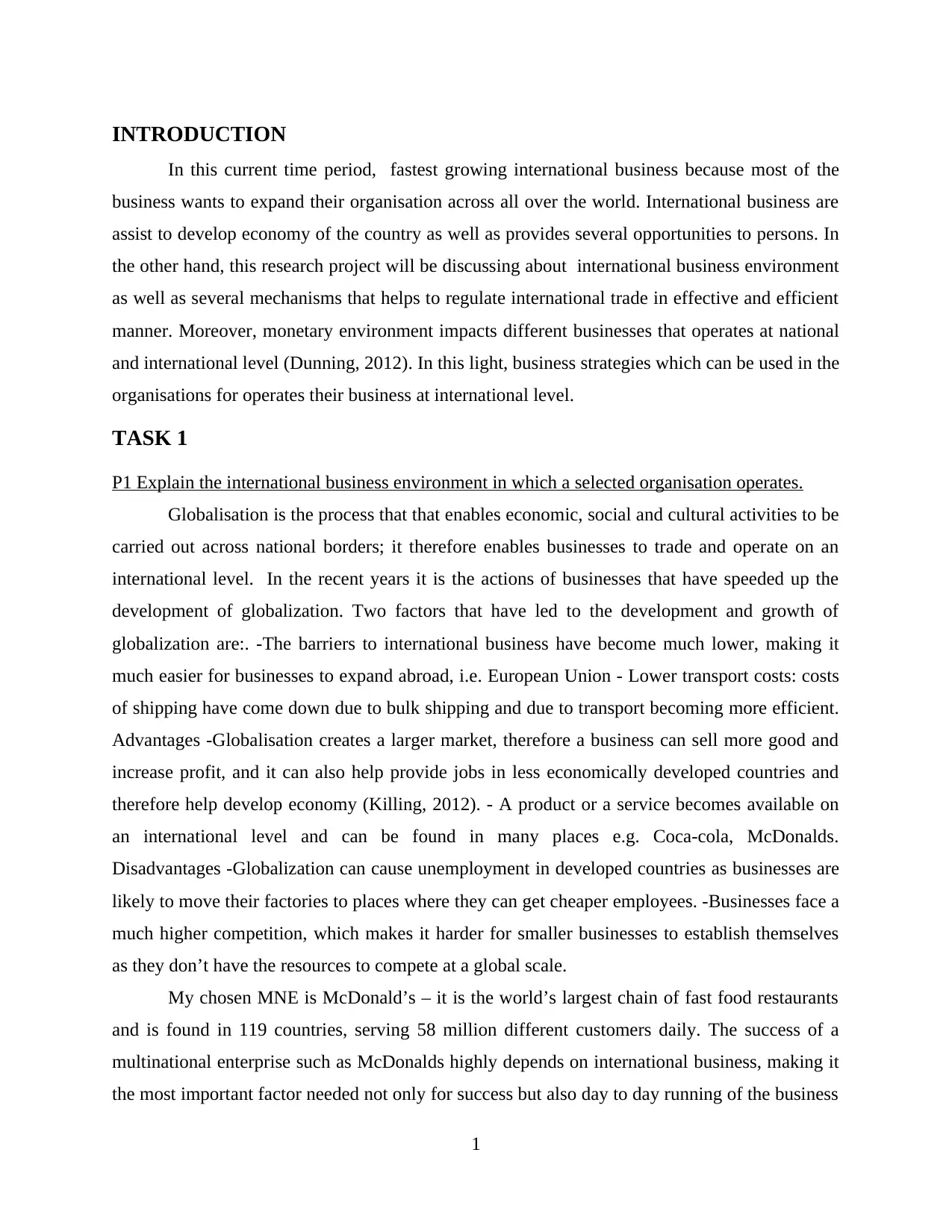
INTRODUCTION
In this current time period, fastest growing international business because most of the
business wants to expand their organisation across all over the world. International business are
assist to develop economy of the country as well as provides several opportunities to persons. In
the other hand, this research project will be discussing about international business environment
as well as several mechanisms that helps to regulate international trade in effective and efficient
manner. Moreover, monetary environment impacts different businesses that operates at national
and international level (Dunning, 2012). In this light, business strategies which can be used in the
organisations for operates their business at international level.
TASK 1
P1 Explain the international business environment in which a selected organisation operates.
Globalisation is the process that that enables economic, social and cultural activities to be
carried out across national borders; it therefore enables businesses to trade and operate on an
international level. In the recent years it is the actions of businesses that have speeded up the
development of globalization. Two factors that have led to the development and growth of
globalization are:. -The barriers to international business have become much lower, making it
much easier for businesses to expand abroad, i.e. European Union - Lower transport costs: costs
of shipping have come down due to bulk shipping and due to transport becoming more efficient.
Advantages -Globalisation creates a larger market, therefore a business can sell more good and
increase profit, and it can also help provide jobs in less economically developed countries and
therefore help develop economy (Killing, 2012). - A product or a service becomes available on
an international level and can be found in many places e.g. Coca-cola, McDonalds.
Disadvantages -Globalization can cause unemployment in developed countries as businesses are
likely to move their factories to places where they can get cheaper employees. -Businesses face a
much higher competition, which makes it harder for smaller businesses to establish themselves
as they don’t have the resources to compete at a global scale.
My chosen MNE is McDonald’s – it is the world’s largest chain of fast food restaurants
and is found in 119 countries, serving 58 million different customers daily. The success of a
multinational enterprise such as McDonalds highly depends on international business, making it
the most important factor needed not only for success but also day to day running of the business
1
In this current time period, fastest growing international business because most of the
business wants to expand their organisation across all over the world. International business are
assist to develop economy of the country as well as provides several opportunities to persons. In
the other hand, this research project will be discussing about international business environment
as well as several mechanisms that helps to regulate international trade in effective and efficient
manner. Moreover, monetary environment impacts different businesses that operates at national
and international level (Dunning, 2012). In this light, business strategies which can be used in the
organisations for operates their business at international level.
TASK 1
P1 Explain the international business environment in which a selected organisation operates.
Globalisation is the process that that enables economic, social and cultural activities to be
carried out across national borders; it therefore enables businesses to trade and operate on an
international level. In the recent years it is the actions of businesses that have speeded up the
development of globalization. Two factors that have led to the development and growth of
globalization are:. -The barriers to international business have become much lower, making it
much easier for businesses to expand abroad, i.e. European Union - Lower transport costs: costs
of shipping have come down due to bulk shipping and due to transport becoming more efficient.
Advantages -Globalisation creates a larger market, therefore a business can sell more good and
increase profit, and it can also help provide jobs in less economically developed countries and
therefore help develop economy (Killing, 2012). - A product or a service becomes available on
an international level and can be found in many places e.g. Coca-cola, McDonalds.
Disadvantages -Globalization can cause unemployment in developed countries as businesses are
likely to move their factories to places where they can get cheaper employees. -Businesses face a
much higher competition, which makes it harder for smaller businesses to establish themselves
as they don’t have the resources to compete at a global scale.
My chosen MNE is McDonald’s – it is the world’s largest chain of fast food restaurants
and is found in 119 countries, serving 58 million different customers daily. The success of a
multinational enterprise such as McDonalds highly depends on international business, making it
the most important factor needed not only for success but also day to day running of the business
1
⊘ This is a preview!⊘
Do you want full access?
Subscribe today to unlock all pages.

Trusted by 1+ million students worldwide
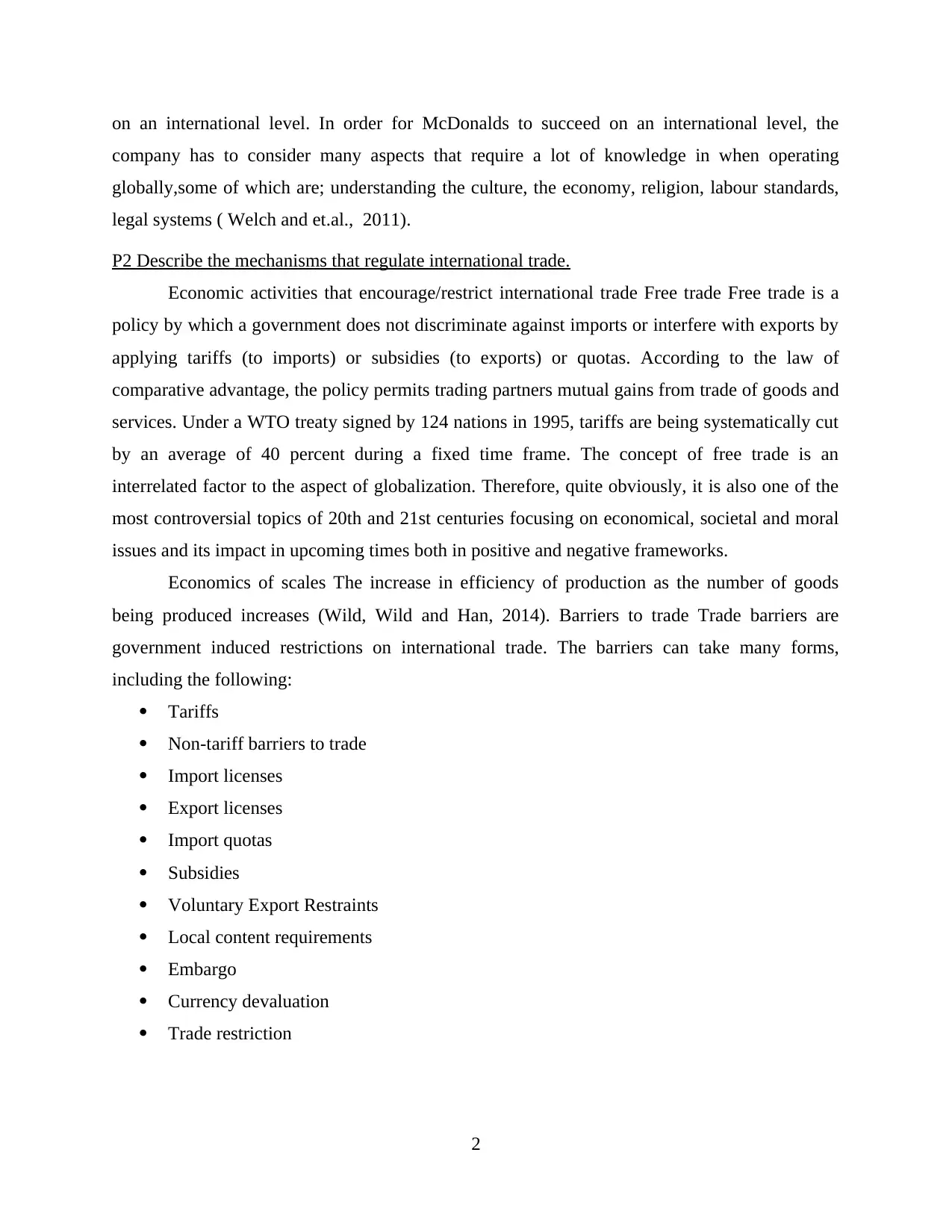
on an international level. In order for McDonalds to succeed on an international level, the
company has to consider many aspects that require a lot of knowledge in when operating
globally,some of which are; understanding the culture, the economy, religion, labour standards,
legal systems ( Welch and et.al., 2011).
P2 Describe the mechanisms that regulate international trade.
Economic activities that encourage/restrict international trade Free trade Free trade is a
policy by which a government does not discriminate against imports or interfere with exports by
applying tariffs (to imports) or subsidies (to exports) or quotas. According to the law of
comparative advantage, the policy permits trading partners mutual gains from trade of goods and
services. Under a WTO treaty signed by 124 nations in 1995, tariffs are being systematically cut
by an average of 40 percent during a fixed time frame. The concept of free trade is an
interrelated factor to the aspect of globalization. Therefore, quite obviously, it is also one of the
most controversial topics of 20th and 21st centuries focusing on economical, societal and moral
issues and its impact in upcoming times both in positive and negative frameworks.
Economics of scales The increase in efficiency of production as the number of goods
being produced increases (Wild, Wild and Han, 2014). Barriers to trade Trade barriers are
government induced restrictions on international trade. The barriers can take many forms,
including the following:
Tariffs
Non-tariff barriers to trade
Import licenses
Export licenses
Import quotas
Subsidies
Voluntary Export Restraints
Local content requirements
Embargo
Currency devaluation
Trade restriction
2
company has to consider many aspects that require a lot of knowledge in when operating
globally,some of which are; understanding the culture, the economy, religion, labour standards,
legal systems ( Welch and et.al., 2011).
P2 Describe the mechanisms that regulate international trade.
Economic activities that encourage/restrict international trade Free trade Free trade is a
policy by which a government does not discriminate against imports or interfere with exports by
applying tariffs (to imports) or subsidies (to exports) or quotas. According to the law of
comparative advantage, the policy permits trading partners mutual gains from trade of goods and
services. Under a WTO treaty signed by 124 nations in 1995, tariffs are being systematically cut
by an average of 40 percent during a fixed time frame. The concept of free trade is an
interrelated factor to the aspect of globalization. Therefore, quite obviously, it is also one of the
most controversial topics of 20th and 21st centuries focusing on economical, societal and moral
issues and its impact in upcoming times both in positive and negative frameworks.
Economics of scales The increase in efficiency of production as the number of goods
being produced increases (Wild, Wild and Han, 2014). Barriers to trade Trade barriers are
government induced restrictions on international trade. The barriers can take many forms,
including the following:
Tariffs
Non-tariff barriers to trade
Import licenses
Export licenses
Import quotas
Subsidies
Voluntary Export Restraints
Local content requirements
Embargo
Currency devaluation
Trade restriction
2
Paraphrase This Document
Need a fresh take? Get an instant paraphrase of this document with our AI Paraphraser
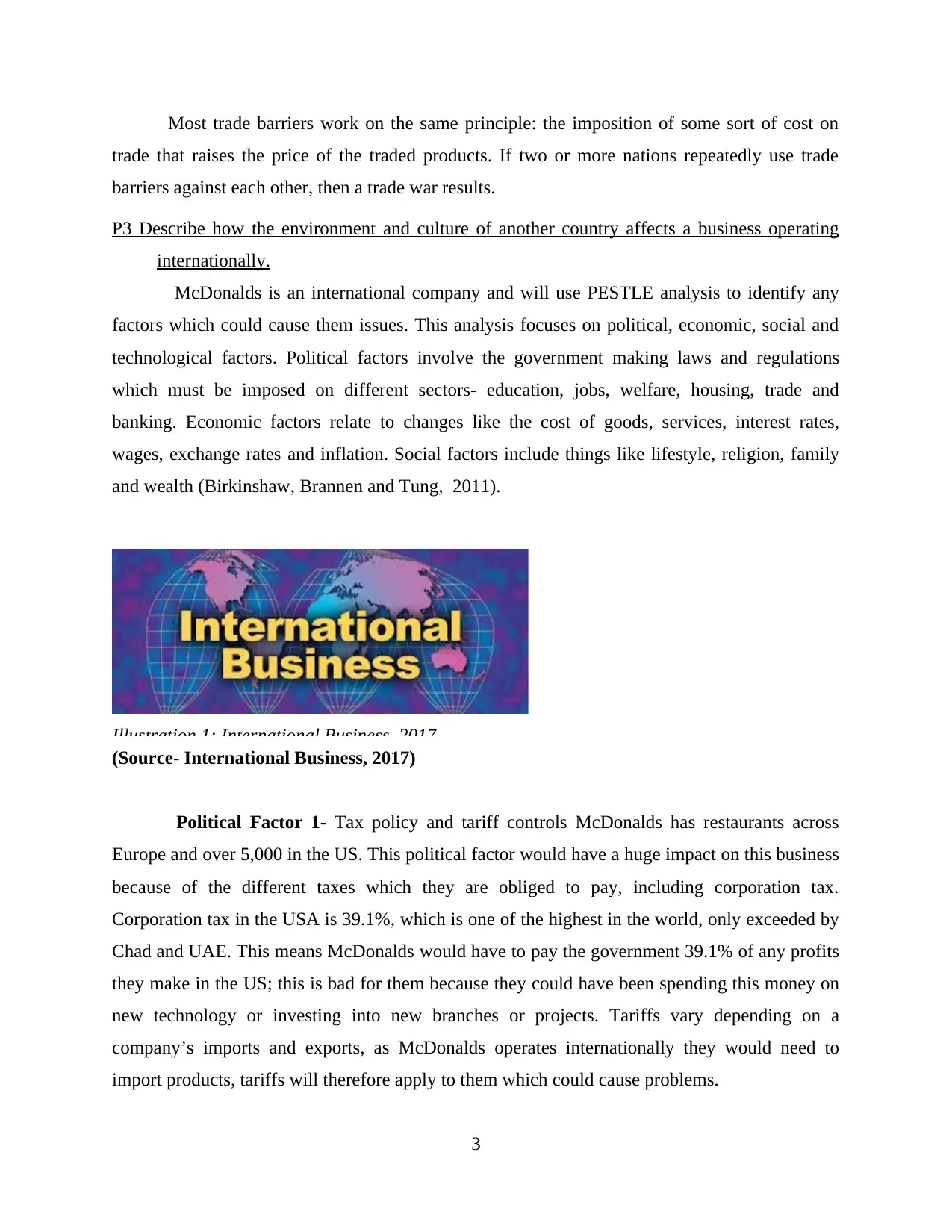
Most trade barriers work on the same principle: the imposition of some sort of cost on
trade that raises the price of the traded products. If two or more nations repeatedly use trade
barriers against each other, then a trade war results.
P3 Describe how the environment and culture of another country affects a business operating
internationally.
McDonalds is an international company and will use PESTLE analysis to identify any
factors which could cause them issues. This analysis focuses on political, economic, social and
technological factors. Political factors involve the government making laws and regulations
which must be imposed on different sectors- education, jobs, welfare, housing, trade and
banking. Economic factors relate to changes like the cost of goods, services, interest rates,
wages, exchange rates and inflation. Social factors include things like lifestyle, religion, family
and wealth (Birkinshaw, Brannen and Tung, 2011).
Illustration 1: International Business, 2017
(Source- International Business, 2017)
Political Factor 1- Tax policy and tariff controls McDonalds has restaurants across
Europe and over 5,000 in the US. This political factor would have a huge impact on this business
because of the different taxes which they are obliged to pay, including corporation tax.
Corporation tax in the USA is 39.1%, which is one of the highest in the world, only exceeded by
Chad and UAE. This means McDonalds would have to pay the government 39.1% of any profits
they make in the US; this is bad for them because they could have been spending this money on
new technology or investing into new branches or projects. Tariffs vary depending on a
company’s imports and exports, as McDonalds operates internationally they would need to
import products, tariffs will therefore apply to them which could cause problems.
3
trade that raises the price of the traded products. If two or more nations repeatedly use trade
barriers against each other, then a trade war results.
P3 Describe how the environment and culture of another country affects a business operating
internationally.
McDonalds is an international company and will use PESTLE analysis to identify any
factors which could cause them issues. This analysis focuses on political, economic, social and
technological factors. Political factors involve the government making laws and regulations
which must be imposed on different sectors- education, jobs, welfare, housing, trade and
banking. Economic factors relate to changes like the cost of goods, services, interest rates,
wages, exchange rates and inflation. Social factors include things like lifestyle, religion, family
and wealth (Birkinshaw, Brannen and Tung, 2011).
Illustration 1: International Business, 2017
(Source- International Business, 2017)
Political Factor 1- Tax policy and tariff controls McDonalds has restaurants across
Europe and over 5,000 in the US. This political factor would have a huge impact on this business
because of the different taxes which they are obliged to pay, including corporation tax.
Corporation tax in the USA is 39.1%, which is one of the highest in the world, only exceeded by
Chad and UAE. This means McDonalds would have to pay the government 39.1% of any profits
they make in the US; this is bad for them because they could have been spending this money on
new technology or investing into new branches or projects. Tariffs vary depending on a
company’s imports and exports, as McDonalds operates internationally they would need to
import products, tariffs will therefore apply to them which could cause problems.
3
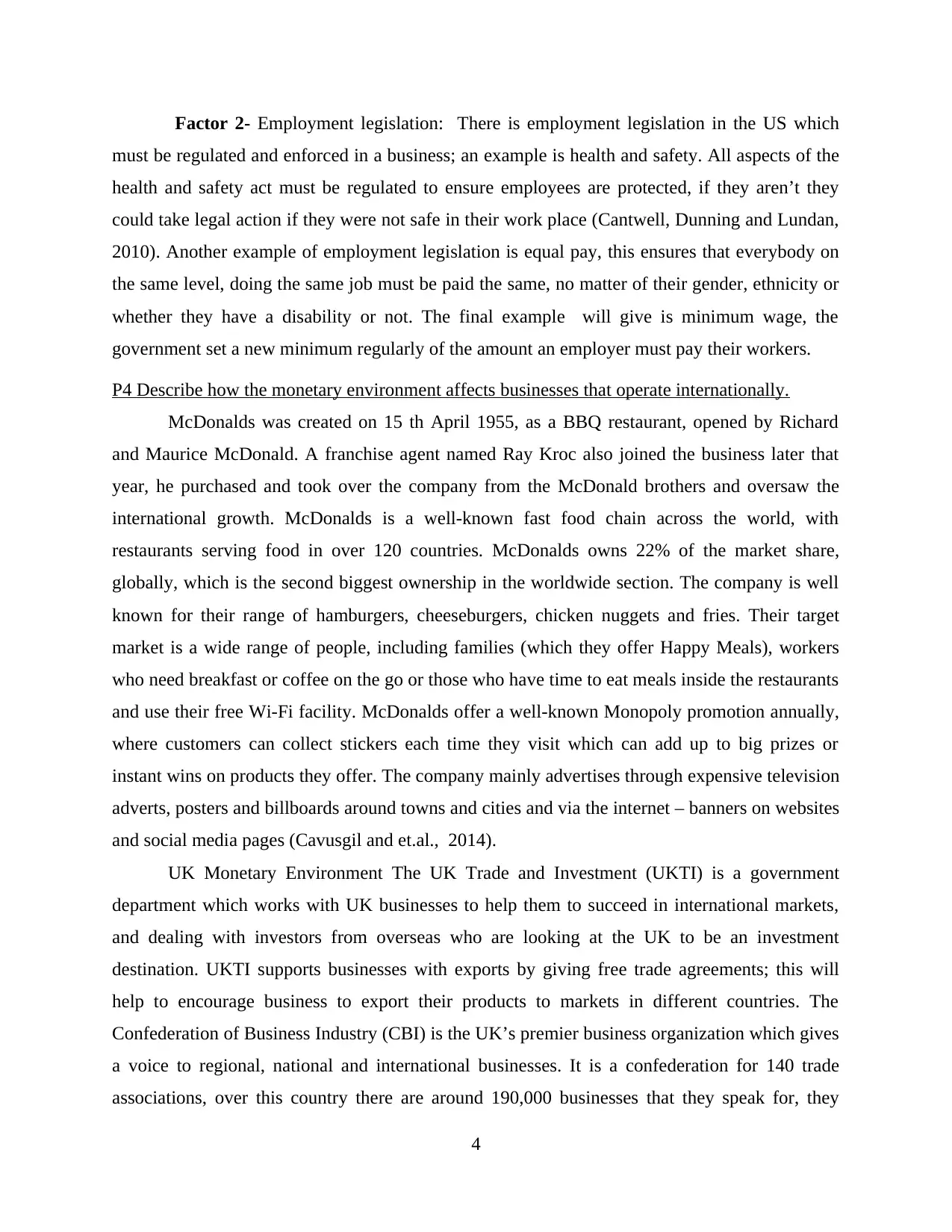
Factor 2- Employment legislation: There is employment legislation in the US which
must be regulated and enforced in a business; an example is health and safety. All aspects of the
health and safety act must be regulated to ensure employees are protected, if they aren’t they
could take legal action if they were not safe in their work place (Cantwell, Dunning and Lundan,
2010). Another example of employment legislation is equal pay, this ensures that everybody on
the same level, doing the same job must be paid the same, no matter of their gender, ethnicity or
whether they have a disability or not. The final example will give is minimum wage, the
government set a new minimum regularly of the amount an employer must pay their workers.
P4 Describe how the monetary environment affects businesses that operate internationally.
McDonalds was created on 15 th April 1955, as a BBQ restaurant, opened by Richard
and Maurice McDonald. A franchise agent named Ray Kroc also joined the business later that
year, he purchased and took over the company from the McDonald brothers and oversaw the
international growth. McDonalds is a well-known fast food chain across the world, with
restaurants serving food in over 120 countries. McDonalds owns 22% of the market share,
globally, which is the second biggest ownership in the worldwide section. The company is well
known for their range of hamburgers, cheeseburgers, chicken nuggets and fries. Their target
market is a wide range of people, including families (which they offer Happy Meals), workers
who need breakfast or coffee on the go or those who have time to eat meals inside the restaurants
and use their free Wi-Fi facility. McDonalds offer a well-known Monopoly promotion annually,
where customers can collect stickers each time they visit which can add up to big prizes or
instant wins on products they offer. The company mainly advertises through expensive television
adverts, posters and billboards around towns and cities and via the internet – banners on websites
and social media pages (Cavusgil and et.al., 2014).
UK Monetary Environment The UK Trade and Investment (UKTI) is a government
department which works with UK businesses to help them to succeed in international markets,
and dealing with investors from overseas who are looking at the UK to be an investment
destination. UKTI supports businesses with exports by giving free trade agreements; this will
help to encourage business to export their products to markets in different countries. The
Confederation of Business Industry (CBI) is the UK’s premier business organization which gives
a voice to regional, national and international businesses. It is a confederation for 140 trade
associations, over this country there are around 190,000 businesses that they speak for, they
4
must be regulated and enforced in a business; an example is health and safety. All aspects of the
health and safety act must be regulated to ensure employees are protected, if they aren’t they
could take legal action if they were not safe in their work place (Cantwell, Dunning and Lundan,
2010). Another example of employment legislation is equal pay, this ensures that everybody on
the same level, doing the same job must be paid the same, no matter of their gender, ethnicity or
whether they have a disability or not. The final example will give is minimum wage, the
government set a new minimum regularly of the amount an employer must pay their workers.
P4 Describe how the monetary environment affects businesses that operate internationally.
McDonalds was created on 15 th April 1955, as a BBQ restaurant, opened by Richard
and Maurice McDonald. A franchise agent named Ray Kroc also joined the business later that
year, he purchased and took over the company from the McDonald brothers and oversaw the
international growth. McDonalds is a well-known fast food chain across the world, with
restaurants serving food in over 120 countries. McDonalds owns 22% of the market share,
globally, which is the second biggest ownership in the worldwide section. The company is well
known for their range of hamburgers, cheeseburgers, chicken nuggets and fries. Their target
market is a wide range of people, including families (which they offer Happy Meals), workers
who need breakfast or coffee on the go or those who have time to eat meals inside the restaurants
and use their free Wi-Fi facility. McDonalds offer a well-known Monopoly promotion annually,
where customers can collect stickers each time they visit which can add up to big prizes or
instant wins on products they offer. The company mainly advertises through expensive television
adverts, posters and billboards around towns and cities and via the internet – banners on websites
and social media pages (Cavusgil and et.al., 2014).
UK Monetary Environment The UK Trade and Investment (UKTI) is a government
department which works with UK businesses to help them to succeed in international markets,
and dealing with investors from overseas who are looking at the UK to be an investment
destination. UKTI supports businesses with exports by giving free trade agreements; this will
help to encourage business to export their products to markets in different countries. The
Confederation of Business Industry (CBI) is the UK’s premier business organization which gives
a voice to regional, national and international businesses. It is a confederation for 140 trade
associations, over this country there are around 190,000 businesses that they speak for, they
4
⊘ This is a preview!⊘
Do you want full access?
Subscribe today to unlock all pages.

Trusted by 1+ million students worldwide
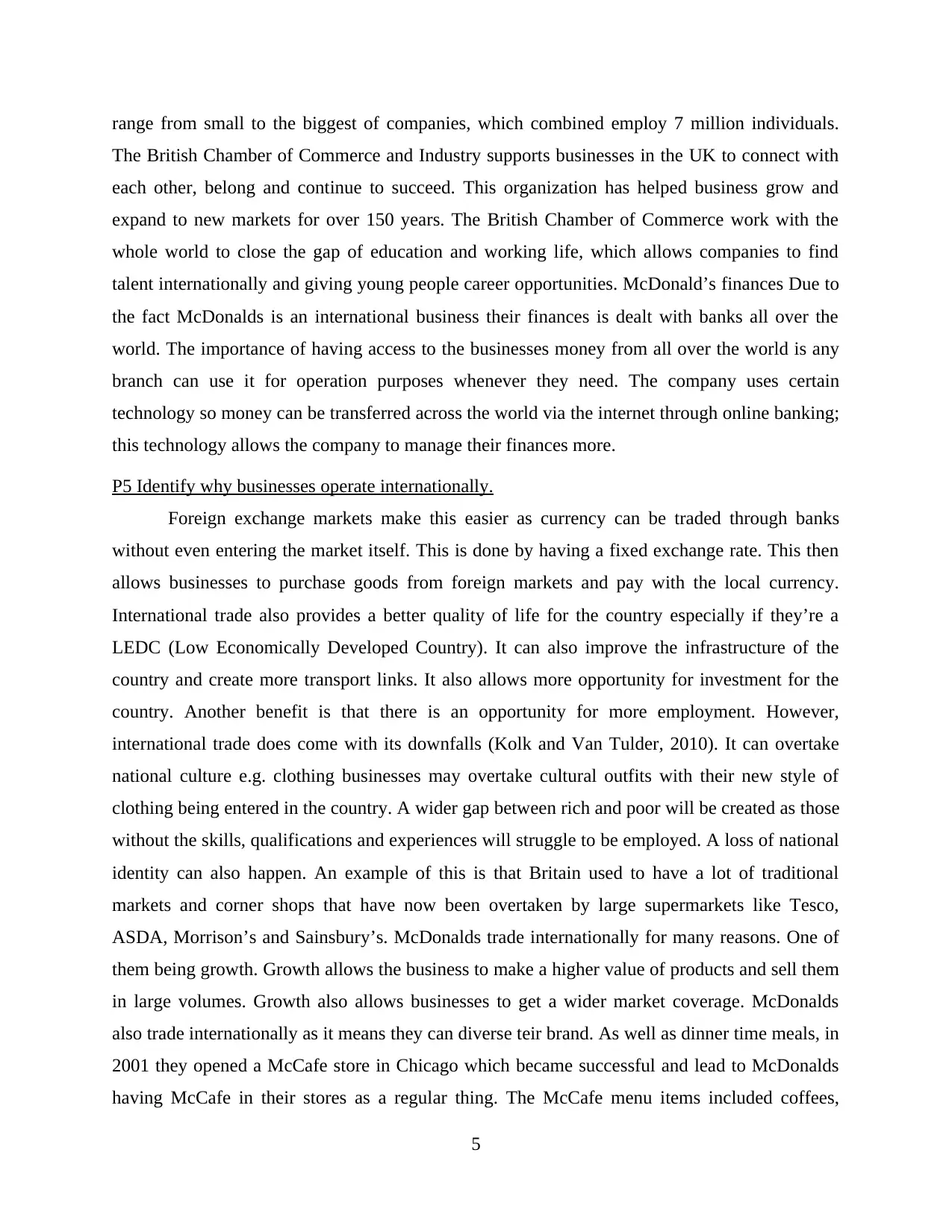
range from small to the biggest of companies, which combined employ 7 million individuals.
The British Chamber of Commerce and Industry supports businesses in the UK to connect with
each other, belong and continue to succeed. This organization has helped business grow and
expand to new markets for over 150 years. The British Chamber of Commerce work with the
whole world to close the gap of education and working life, which allows companies to find
talent internationally and giving young people career opportunities. McDonald’s finances Due to
the fact McDonalds is an international business their finances is dealt with banks all over the
world. The importance of having access to the businesses money from all over the world is any
branch can use it for operation purposes whenever they need. The company uses certain
technology so money can be transferred across the world via the internet through online banking;
this technology allows the company to manage their finances more.
P5 Identify why businesses operate internationally.
Foreign exchange markets make this easier as currency can be traded through banks
without even entering the market itself. This is done by having a fixed exchange rate. This then
allows businesses to purchase goods from foreign markets and pay with the local currency.
International trade also provides a better quality of life for the country especially if they’re a
LEDC (Low Economically Developed Country). It can also improve the infrastructure of the
country and create more transport links. It also allows more opportunity for investment for the
country. Another benefit is that there is an opportunity for more employment. However,
international trade does come with its downfalls (Kolk and Van Tulder, 2010). It can overtake
national culture e.g. clothing businesses may overtake cultural outfits with their new style of
clothing being entered in the country. A wider gap between rich and poor will be created as those
without the skills, qualifications and experiences will struggle to be employed. A loss of national
identity can also happen. An example of this is that Britain used to have a lot of traditional
markets and corner shops that have now been overtaken by large supermarkets like Tesco,
ASDA, Morrison’s and Sainsbury’s. McDonalds trade internationally for many reasons. One of
them being growth. Growth allows the business to make a higher value of products and sell them
in large volumes. Growth also allows businesses to get a wider market coverage. McDonalds
also trade internationally as it means they can diverse teir brand. As well as dinner time meals, in
2001 they opened a McCafe store in Chicago which became successful and lead to McDonalds
having McCafe in their stores as a regular thing. The McCafe menu items included coffees,
5
The British Chamber of Commerce and Industry supports businesses in the UK to connect with
each other, belong and continue to succeed. This organization has helped business grow and
expand to new markets for over 150 years. The British Chamber of Commerce work with the
whole world to close the gap of education and working life, which allows companies to find
talent internationally and giving young people career opportunities. McDonald’s finances Due to
the fact McDonalds is an international business their finances is dealt with banks all over the
world. The importance of having access to the businesses money from all over the world is any
branch can use it for operation purposes whenever they need. The company uses certain
technology so money can be transferred across the world via the internet through online banking;
this technology allows the company to manage their finances more.
P5 Identify why businesses operate internationally.
Foreign exchange markets make this easier as currency can be traded through banks
without even entering the market itself. This is done by having a fixed exchange rate. This then
allows businesses to purchase goods from foreign markets and pay with the local currency.
International trade also provides a better quality of life for the country especially if they’re a
LEDC (Low Economically Developed Country). It can also improve the infrastructure of the
country and create more transport links. It also allows more opportunity for investment for the
country. Another benefit is that there is an opportunity for more employment. However,
international trade does come with its downfalls (Kolk and Van Tulder, 2010). It can overtake
national culture e.g. clothing businesses may overtake cultural outfits with their new style of
clothing being entered in the country. A wider gap between rich and poor will be created as those
without the skills, qualifications and experiences will struggle to be employed. A loss of national
identity can also happen. An example of this is that Britain used to have a lot of traditional
markets and corner shops that have now been overtaken by large supermarkets like Tesco,
ASDA, Morrison’s and Sainsbury’s. McDonalds trade internationally for many reasons. One of
them being growth. Growth allows the business to make a higher value of products and sell them
in large volumes. Growth also allows businesses to get a wider market coverage. McDonalds
also trade internationally as it means they can diverse teir brand. As well as dinner time meals, in
2001 they opened a McCafe store in Chicago which became successful and lead to McDonalds
having McCafe in their stores as a regular thing. The McCafe menu items included coffees,
5
Paraphrase This Document
Need a fresh take? Get an instant paraphrase of this document with our AI Paraphraser
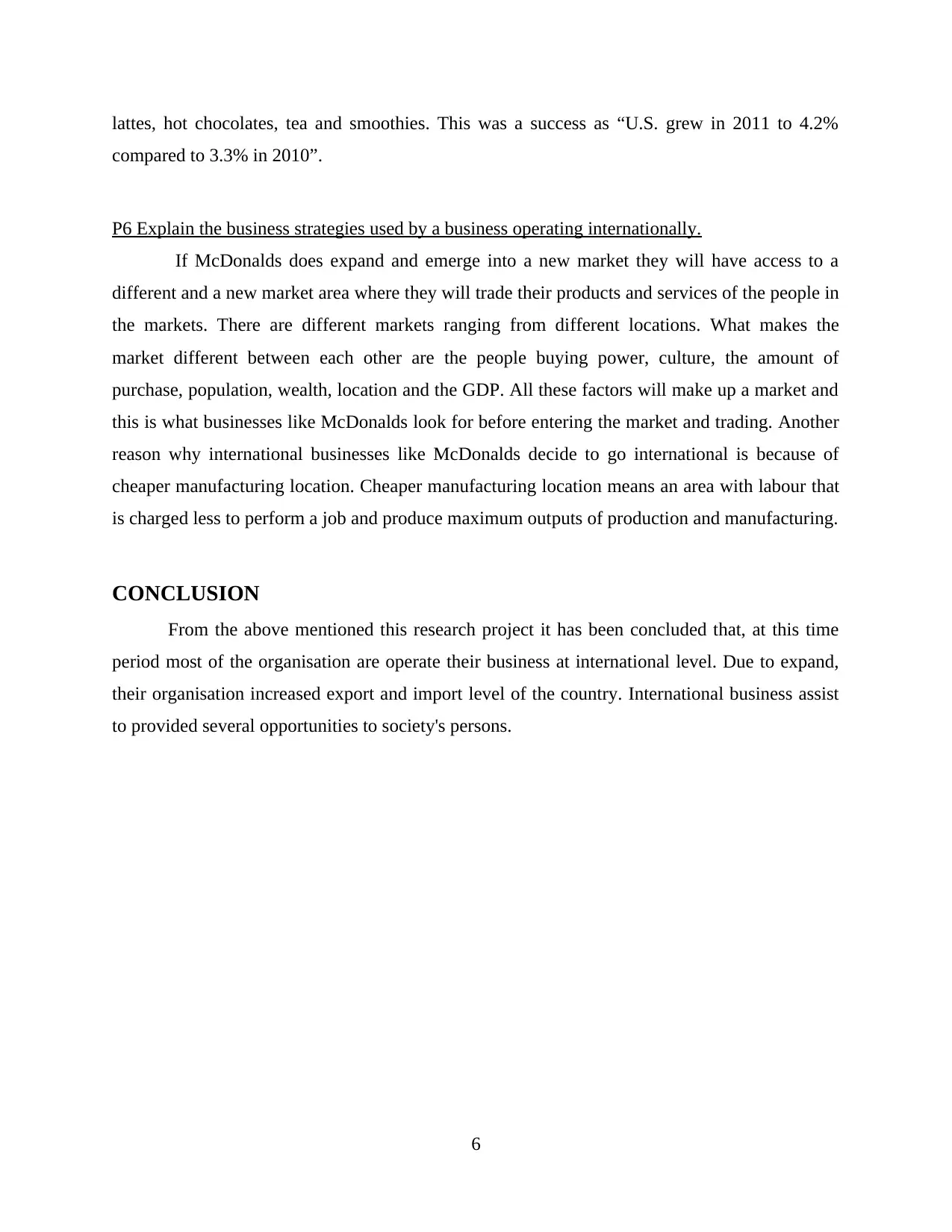
lattes, hot chocolates, tea and smoothies. This was a success as “U.S. grew in 2011 to 4.2%
compared to 3.3% in 2010”.
P6 Explain the business strategies used by a business operating internationally.
If McDonalds does expand and emerge into a new market they will have access to a
different and a new market area where they will trade their products and services of the people in
the markets. There are different markets ranging from different locations. What makes the
market different between each other are the people buying power, culture, the amount of
purchase, population, wealth, location and the GDP. All these factors will make up a market and
this is what businesses like McDonalds look for before entering the market and trading. Another
reason why international businesses like McDonalds decide to go international is because of
cheaper manufacturing location. Cheaper manufacturing location means an area with labour that
is charged less to perform a job and produce maximum outputs of production and manufacturing.
CONCLUSION
From the above mentioned this research project it has been concluded that, at this time
period most of the organisation are operate their business at international level. Due to expand,
their organisation increased export and import level of the country. International business assist
to provided several opportunities to society's persons.
6
compared to 3.3% in 2010”.
P6 Explain the business strategies used by a business operating internationally.
If McDonalds does expand and emerge into a new market they will have access to a
different and a new market area where they will trade their products and services of the people in
the markets. There are different markets ranging from different locations. What makes the
market different between each other are the people buying power, culture, the amount of
purchase, population, wealth, location and the GDP. All these factors will make up a market and
this is what businesses like McDonalds look for before entering the market and trading. Another
reason why international businesses like McDonalds decide to go international is because of
cheaper manufacturing location. Cheaper manufacturing location means an area with labour that
is charged less to perform a job and produce maximum outputs of production and manufacturing.
CONCLUSION
From the above mentioned this research project it has been concluded that, at this time
period most of the organisation are operate their business at international level. Due to expand,
their organisation increased export and import level of the country. International business assist
to provided several opportunities to society's persons.
6
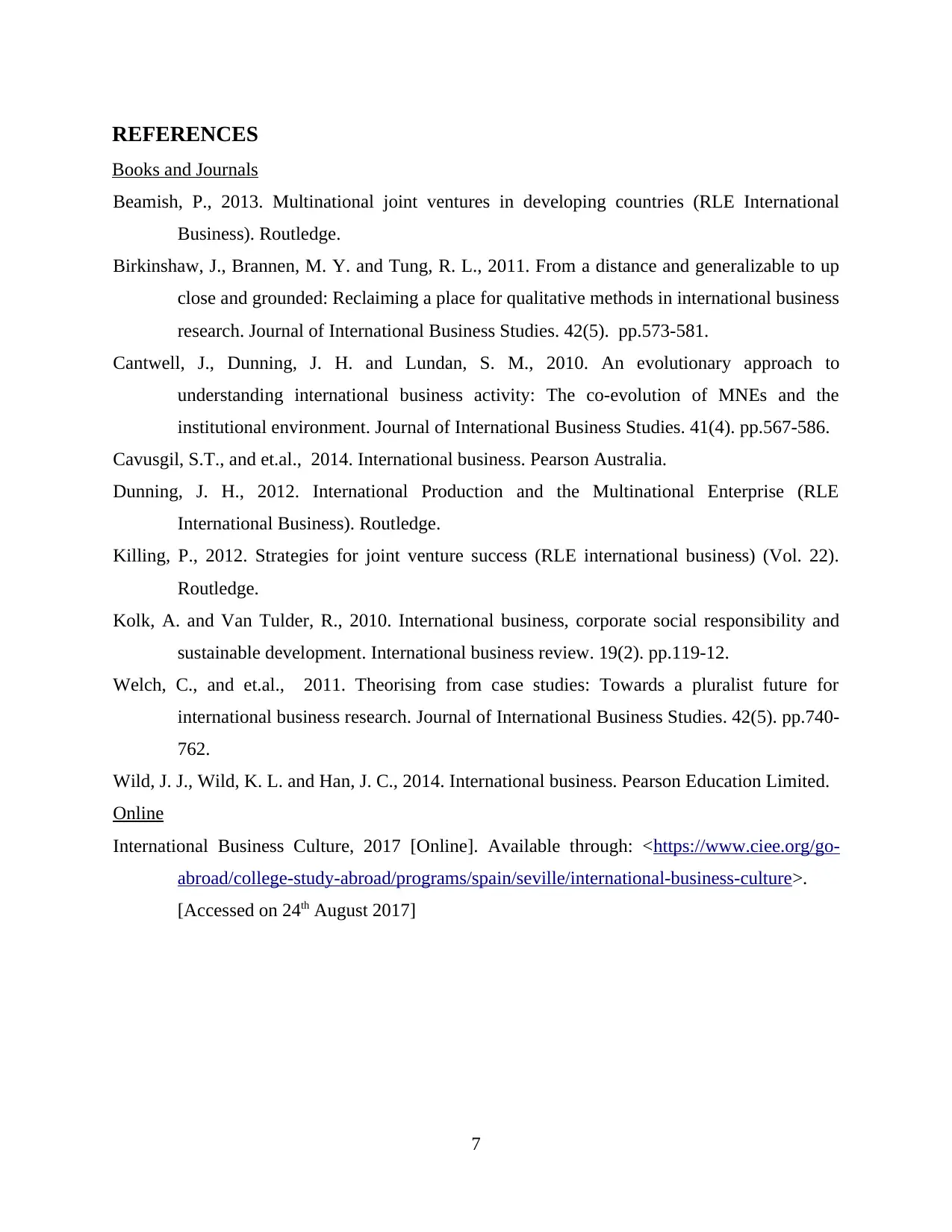
REFERENCES
Books and Journals
Beamish, P., 2013. Multinational joint ventures in developing countries (RLE International
Business). Routledge.
Birkinshaw, J., Brannen, M. Y. and Tung, R. L., 2011. From a distance and generalizable to up
close and grounded: Reclaiming a place for qualitative methods in international business
research. Journal of International Business Studies. 42(5). pp.573-581.
Cantwell, J., Dunning, J. H. and Lundan, S. M., 2010. An evolutionary approach to
understanding international business activity: The co-evolution of MNEs and the
institutional environment. Journal of International Business Studies. 41(4). pp.567-586.
Cavusgil, S.T., and et.al., 2014. International business. Pearson Australia.
Dunning, J. H., 2012. International Production and the Multinational Enterprise (RLE
International Business). Routledge.
Killing, P., 2012. Strategies for joint venture success (RLE international business) (Vol. 22).
Routledge.
Kolk, A. and Van Tulder, R., 2010. International business, corporate social responsibility and
sustainable development. International business review. 19(2). pp.119-12.
Welch, C., and et.al., 2011. Theorising from case studies: Towards a pluralist future for
international business research. Journal of International Business Studies. 42(5). pp.740-
762.
Wild, J. J., Wild, K. L. and Han, J. C., 2014. International business. Pearson Education Limited.
Online
International Business Culture, 2017 [Online]. Available through: <https://www.ciee.org/go-
abroad/college-study-abroad/programs/spain/seville/international-business-culture>.
[Accessed on 24th August 2017]
7
Books and Journals
Beamish, P., 2013. Multinational joint ventures in developing countries (RLE International
Business). Routledge.
Birkinshaw, J., Brannen, M. Y. and Tung, R. L., 2011. From a distance and generalizable to up
close and grounded: Reclaiming a place for qualitative methods in international business
research. Journal of International Business Studies. 42(5). pp.573-581.
Cantwell, J., Dunning, J. H. and Lundan, S. M., 2010. An evolutionary approach to
understanding international business activity: The co-evolution of MNEs and the
institutional environment. Journal of International Business Studies. 41(4). pp.567-586.
Cavusgil, S.T., and et.al., 2014. International business. Pearson Australia.
Dunning, J. H., 2012. International Production and the Multinational Enterprise (RLE
International Business). Routledge.
Killing, P., 2012. Strategies for joint venture success (RLE international business) (Vol. 22).
Routledge.
Kolk, A. and Van Tulder, R., 2010. International business, corporate social responsibility and
sustainable development. International business review. 19(2). pp.119-12.
Welch, C., and et.al., 2011. Theorising from case studies: Towards a pluralist future for
international business research. Journal of International Business Studies. 42(5). pp.740-
762.
Wild, J. J., Wild, K. L. and Han, J. C., 2014. International business. Pearson Education Limited.
Online
International Business Culture, 2017 [Online]. Available through: <https://www.ciee.org/go-
abroad/college-study-abroad/programs/spain/seville/international-business-culture>.
[Accessed on 24th August 2017]
7
⊘ This is a preview!⊘
Do you want full access?
Subscribe today to unlock all pages.

Trusted by 1+ million students worldwide
1 out of 9
Related Documents
Your All-in-One AI-Powered Toolkit for Academic Success.
+13062052269
info@desklib.com
Available 24*7 on WhatsApp / Email
![[object Object]](/_next/static/media/star-bottom.7253800d.svg)
Unlock your academic potential
Copyright © 2020–2026 A2Z Services. All Rights Reserved. Developed and managed by ZUCOL.





